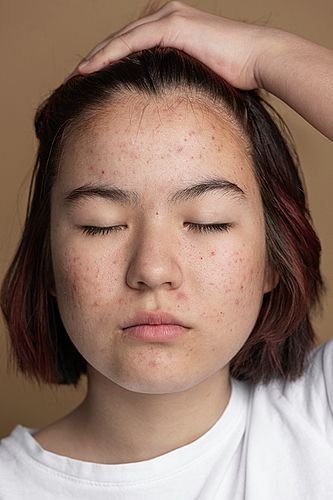Dr. Dang Thi Ngoc Bich, specialist in Dermatology – Skin Aesthetics, Tam Anh General Hospital, Ho Chi Minh City, said acne during puberty tends to gradually decrease as adults or thanks to maintaining care habits.
Benzoyl peroxide and salicylic acid
Benzoyl peroxide and salicylic acid are two popular over-the-counter acne treatments.
Benzoyl peroxide is a stronger treatment for more severe, red, inflamed acne that helps dry out dead skin cells, control excess sebum, and kill acne-causing bacteria.
Benzoyl peroxide is a strong active ingredient that can cause skin rashes and irritation, so apply it once at the beginning of use, then increase to twice a day.
Acne often appears when entering puberty.
Retinoids
If benzoyl peroxide is not effective, your dermatologist will prescribe an acne retinoid gel or cream, which can be applied twice a day.
Isotretinoin is a retinoid that comes in daily pill form, much stronger than topical retinoids, so it requires a doctor’s prescription and monitoring during use.
Topical and oral antibiotics
Treating puberty acne is also applied using antibiotics to help eliminate inflammatory acne caused by P. acnes bacteria.
The products are hypoallergenic
You need to carefully look at the ingredients before using, do not use products that contain irritants that cause allergies such as alcohol, perfume… The words `Noncomedogenic` mean that they do not contain oil, do not cause acne or do not cause acne.
Wash your skin twice a day
Cleansing the skin is very important in caring for and improving acne.
You should wash your face twice a day and wash your face after exercising if you sweat.
Exfoliate weekly
Exfoliating once a week can also help treat teenage acne effectively.
Apply sunscreen daily
Sunscreen helps protect the skin from the harmful effects of sunlight, preventing acne caused by sunburn.
You should use sunscreen products with SPF 30 or higher for more effective protection, products labeled `non-comedogenic` or `oil-free`.
Change your diet
Some foods can contribute to acne such as: milk, overly sweet foods, and processed foods.
Don’t squeeze pimples
Dr.
There are many ways to treat acne during puberty, but when acne appears, the patient needs to see a doctor specializing in Dermatology – Skin Aesthetics for examination to have appropriate treatment methods for the acne condition.










